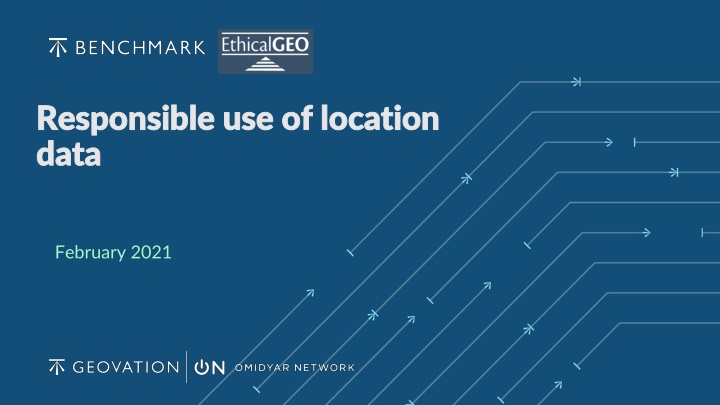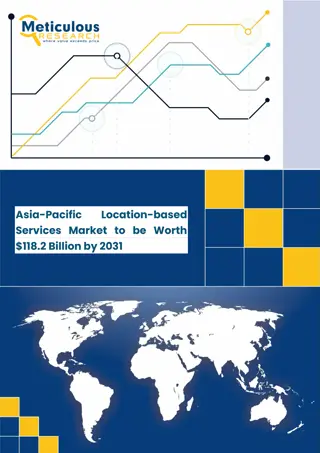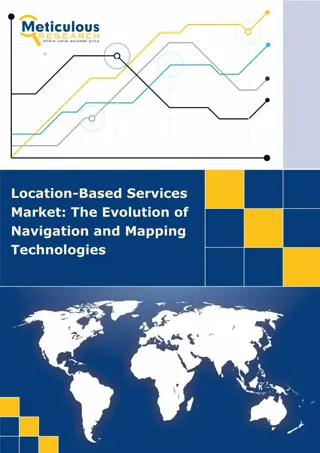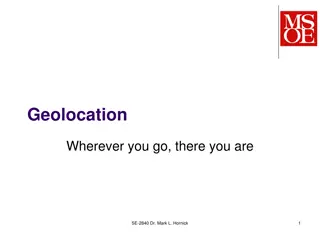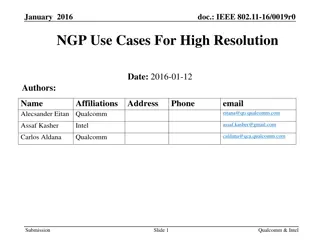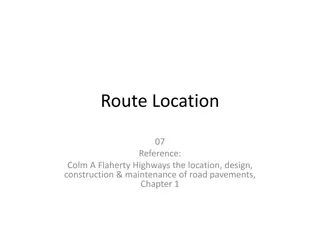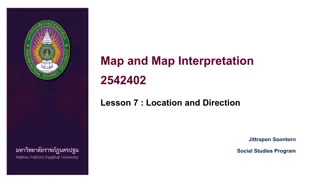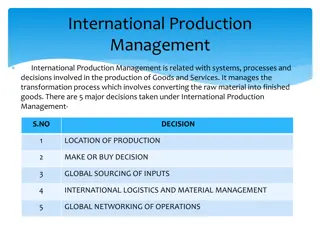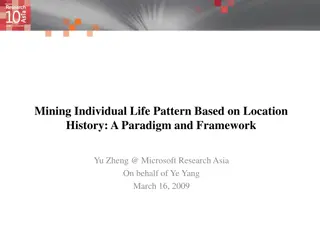Responsible Use of Location Data - February 2021
Utilizing location data ethically and responsibly can lead to improved services and innovations across various sectors. However, with the power of data comes the responsibility to address potential risks such as bias, privacy concerns, and market power imbalances. Understanding the impact and implications of datafication is crucial in ensuring equitable and transparent data practices. Location data integration is becoming essential for enhancing local services and decision-making processes, highlighting the need for responsible data usage.
Download Presentation

Please find below an Image/Link to download the presentation.
The content on the website is provided AS IS for your information and personal use only. It may not be sold, licensed, or shared on other websites without obtaining consent from the author.If you encounter any issues during the download, it is possible that the publisher has removed the file from their server.
You are allowed to download the files provided on this website for personal or commercial use, subject to the condition that they are used lawfully. All files are the property of their respective owners.
The content on the website is provided AS IS for your information and personal use only. It may not be sold, licensed, or shared on other websites without obtaining consent from the author.
E N D
Presentation Transcript
Responsible use of location Responsible use of location data data February 2021
Benchmark Benchmark Supported by PlaceFund (part of the Omidyar Network) and Ordnance Survey Complementary program in USA EthicalGeo
More data and better tools make location data More data and better tools make location data applications more powerful applications more powerful Improving and converging tech drives better services: - optimising supply chains - planning and local economic development - public service provision - environmental monitoring - resource management for sustainability - consumer services: maps, delivery and micro-mobility, location-based advertising - new applications to manage the pandemic
New power brings advantages, but also potential New power brings advantages, but also potential harms harms New power in markets Impacts on individuals Incidental and unintended impacts Collective effects on groups Aggregate impacts on the environment and on society With power comes responsibility! With power comes responsibility!
Datafication (expressing and managing the world with data) Datafication (expressing and managing the world with data) generates similar types of risk across domains generates similar types of risk across domains Bias: risks for those who are excluded, unrepresented, over-represented in datasets; vulnerable, lack data literacy skills, excluded from benefits; diversity among geospatial practitioners Privacy: intrusion into individual and collective lives, and exercising influence on them Market power and data colonialism: more resourced companies and countries exercising power over the less resourced (individuals, groups, countries) Complexity: advanced data services create challenges in transparency and accountability, increasing as more technologies converge
Why does this matter to you? Why does this matter to you? Location will become embedded into many local services and decision processes Demand for data integration and dashboards, datastores and control rooms Ongoing, evolving demand for managing buildings, movement and public space Increased automation of city operations and services More urban applications of Internet of Things; supported by more cybersecurity applications
New opportunities and new questions New opportunities and new questions Great potential for getting resources to the right places and people more effectively, and managing places better But as with any datafied services, you need to understand and manage the risks, like bias, privacy, power imbalances, and decisions that are hard to explain In the pandemic we ve already seen location data in new ways: tracking infections (individual and spatial); managing distancing at work and in public there s probably more of this to come! More surveillance, more fear of surveillance, increased responsibilities
Increasingly complex data applications for places Increasingly complex data applications for places Monitoring of infrastructure Computer vision analysis of CCTV to identify violations, eg fly-tipping Monitoring and management of traffic and air pollution Analysis of bulk internet of things data to track weather, sound, movement, streetlighting Improved planning Social media monitoring to understand citizens needs New analysis of complex problems Faster and more accurate analysis of local economies
Draft Principles Draft Principles (Feb 2021) (Feb 2021) Principle One Realize opportunities: Location data offers many social and economic benefits, and these opportunities should be realized responsibly. Principle Two Understand impacts: Users of location data have responsibility to understand the potential effects of their uses of data, including knowing who (individuals and groups) and what could be affected, and how. That understanding should be used to make informed and proportionate decisions, and to minimize negative impacts.
Principle Three Do no harm: Physical proximity amplifies the potential harms that can befall people, flora and fauna. Data users should ensure that the individual or collective location data pertaining to all species should not be used to discriminate, exploit or harm. Rights established in the physical world must be protected in digital contexts and interactions. Principle Four Protect the vulnerable: Vulnerable people and places can be disproportionately harmed by the misuses of location data, and may lack the capacity to protect themselves. In these contexts, data users should take additional care, act proportionately, and positively avoid causing harm.
Principle Five Address bias: Bias in the collection, use, and combination of location datasets can either remove affected groups from mapping that conveys rights or services, or amplify negative impacts of inclusion in a dataset. Therefore care should be taken to understand bias in the datasets and avoid discriminatory outcomes. Principle Six Minimize intrusion: Given the intimate and personal nature of location data, users should avoid unnecessary and intrusive examination of people s lives and the places they live in, that would undermine human dignity.
Principle Seven Minimize data: Most business and mission applications do not require the most invasive scale of location tracking available in order to provide the intended level of service. Users should comply with practices that adhere to the data minimization principle of using only the necessary personal data that is adequate, relevant and limited to the objective, including abstracting location data to the least invasive scale feasible for the application. Principle Eight Protect privacy: Tracking the movement of individuals through space and time gives insights into the most intimate aspects of their lives. In the rare cases when aggregated and anonymized location data will not meet the specific business or mission need, location data that identifies individuals should be respected, protected, and used with informed consent where possible and proportionate.
Principle Nine Prevent identification of individuals: As an individual s mobile location data is situated within more and more geospatial context data, its anonymity erodes, measures should be put in place to prevent subsequent use of the data resulting in identification of individuals or their location. Principle Ten Provide accountability: People who are represented in location data collected, combined and, used by organizations should be able to interrogate how it is collected and used in relation to them and their interests, and appeal uses proportionate to levels of detail and potential for harms.
Ethical guidelines to support use of local Ethical guidelines to support use of local data in local services? data in local services? Bias in local data leading to bias in local service coverage Privacy and surveillance: how far towards the City Brain model? How to represent collective rights and interests in data Optimising AI applications: for whose benefit? In planning, traffic management, air quality Transparency: should a public service implement decisions it can t explain? Automation: done for citizens, or to them?
Thank you Thank you Ben Hawes ben@brunelhawes.com
